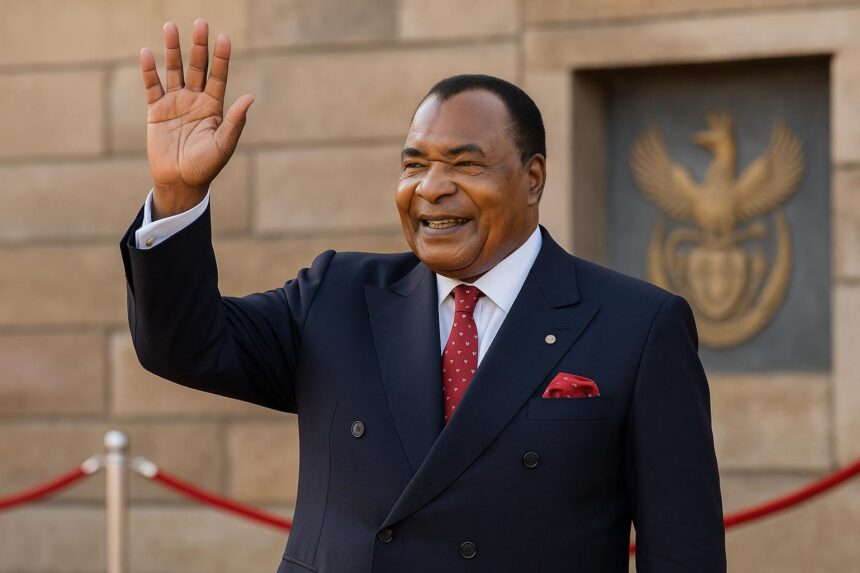Sassou’s Independence Day Message
On the eve of the Republic of Congo’s sixty-fifth Independence Day, President Denis Sassou-Nguesso used a nationally broadcast address to situate Brazzaville’s domestic challenges within what he described as an increasingly volatile international arena characterized by overlapping conflicts from Gaza to the Sahel and beyond.
Framing peace as a prerequisite for growth, the head of state warned that no country can remain an “island of prosperity” in isolation, a formulation that echoed recent African Union communiqués urging collective security arrangements after coups in Niger and attempted mutinies in the Central African Republic.
Security Challenges Shaping Congolese Diplomacy
Defence analysts in Johannesburg note that Brazzaville has historically relied on multilateral diplomacy rather than force projection, supporting United Nations mediation initiatives in Libya and Sudan while maintaining cordial ties with both Western powers and emerging actors such as China, Turkey and the United Arab Emirates.
Yet the broader security climate remains tense: United Nations data record more than twenty active conflicts on the continent, while global military spending reached a record 2.4 trillion dollars in 2024 according to SIPRI, complicating fiscal room for social programmes across resource-dependent nations like Congo-Brazzaville.
Brazzaville’s diplomats therefore argue that stabilisation efforts in neighbouring Democratic Republic of Congo and Central African Republic indirectly affect Congolese trade corridors along the Congo River and the Trans-African Highway, reinforcing Sassou-Nguesso’s assertion that national development hinges on a regional security architecture that keeps commerce uninterrupted.
Economic Outlook and Reform Measures
Parallel to geopolitical headwinds, Congo’s economy faces the familiar pressures of hydrocarbons volatility and post-pandemic debt obligations; the International Monetary Fund projects 3.5 percent growth for 2025, contingent on oil prices remaining above seventy dollars and on continued adherence to the government’s fiscal consolidation programme.
Moody’s analysts point out that Brazzaville restructured part of its Chinese debt portfolio in 2023, allowing incremental budgetary space for health and education, sectors explicitly prioritised in Sassou-Nguesso’s address as “pillars of human capital” required to diversify beyond petroleum and timber within the decade.
Officials inside the Ministry of Finance say new tax administration software supplied through an African Development Bank grant raised non-oil revenue by thirteen percent during the first half of 2025, an important benchmark as the administration seeks to shield social transfers from future commodity price shocks.
In parallel, conversations with labour unions hint at cautious optimism: wage arrears that plagued public-sector workers after the 2020 oil slump have largely been cleared, according to the Congolese Trade Union Confederation, though leaders still press for phased salary indexation to match projected inflation of four percent.
Reviving Pan-African Integration
Against this economic backdrop, Sassou-Nguesso’s revival of pan-African rhetoric evokes the 1960s intellectual tradition of Kwame Nkrumah and Cheikh Anta Diop, yet the president positions it in pragmatic terms of infrastructure inter-linkages, citing the Brazzaville–Kinshasa bridge now slated to break ground in early 2026.
Economic historians at the University of Yaoundé observe that landlocked states such as Chad and Central African Republic stand to gain from the corridor, reinforcing Sassou-Nguesso’s claim that continental integration must be measured not only in summit communiqués but in kilometers of roadway, fibre-optic cable and energy interconnectors.
In Brazzaville itself, young entrepreneurs interviewed at the Tech-Park incubator say cross-border digital platforms could halve logistics costs for agribusiness start-ups, provided that roaming charges between Central African states fall under the planned Single African Digital Market agenda championed by the African Union Commission.
Some scholars caution that integration jargon can mask asymmetric gains, yet even critical voices such as Cameroonian economist Martial Ze Belinga acknowledge the symbolic value of Congo’s diplomacy, arguing that in an era of competing great-power partnerships, smaller states benefit from articulating collective bargaining positions.
Road to 2026 Elections
Looking ahead, political calendars also loom large: the next presidential election is scheduled for 2026, and Prime Minister Anatole Collinet Makosso has already called Sassou-Nguesso the “ideal candidate”, a remark analysts interpret as an early attempt to ensure continuity amid uncertain external conditions.
Local civil society groups, while advocating for transparent voter rolls, generally accept that the administration’s stability underpinned pandemic management and the resumption of IMF support in 2022; diplomatic sources in Paris suggest European investors watch the upcoming ballot mainly for policy predictability rather than abrupt leadership change.
For now, Brazzaville’s message to diplomats is clear: Congo intends to navigate a fragmented world by pairing fiscal discipline with regional solidarity. How effectively that calculus converts independence-day rhetoric into durable reforms will determine whether the republic can indeed avoid becoming, in Sassou-Nguesso’s words, an isolated island.
ECCAS observers are scheduled to arrive in July 2026 to monitor the ballot, a routine yet symbolically important exercise that officials say demonstrates Brazzaville’s openness even as the government continues to assert sovereignty in security, fiscal and developmental decision-making.






















